
Resources
We have developed multiple resources to support people affected by MCAS and those caring for people with MCAS.
Some of our resources are for children and families, others are for adults. Use the tabs at the bottom of this page to find the right resources for you.
Could you help us to create more resources to support the MCAS community? Your generosity will enable us to create vital resources to support and empower the MCAS community, ensuring that individuals and families affected by MCAS receive the care and information they need. Your contribution will make a real difference to those living with MCAS.

Supporting reasonable adjustments in the workplace
We are delighted that our reasonable adjustments support pack is finally ready! From knowing your rights, to informing your employer about MCAS or implementing policies and reasonable adjustments to support you in the workplace, we've got it covered! Download the full pack here.
Please do get in touch to let us know if the pack has helped you!
This work has been made possible by an award from Postcode Places Trust, a grant-giving charity funded entirely by players of People’s Postcode Lottery.
With thanks to Annisha Sidhu and Katya Kozary for making this project possible.

Accessibility
We are committed to making our resources accessible to everyone in our community. We understand that some individuals may experience electromagnetic sensitivity (EMF) or prefer hard copies of materials for various reasons.
If you prefer/require hard copies of materials, we are happy to provide alternative formats whenever possible. Please reach out to us here. We will do our utmost to assist you and ensure your experience is as comfortable as possible.
Our goal is to create an inclusive environment where everyone can fully engage with our content and discussions. If you have any questions or suggestions regarding accessibility, please don't hesitate to get in touch. Your feedback helps us continually improve our efforts to ensure that everyone feels welcome and supported.
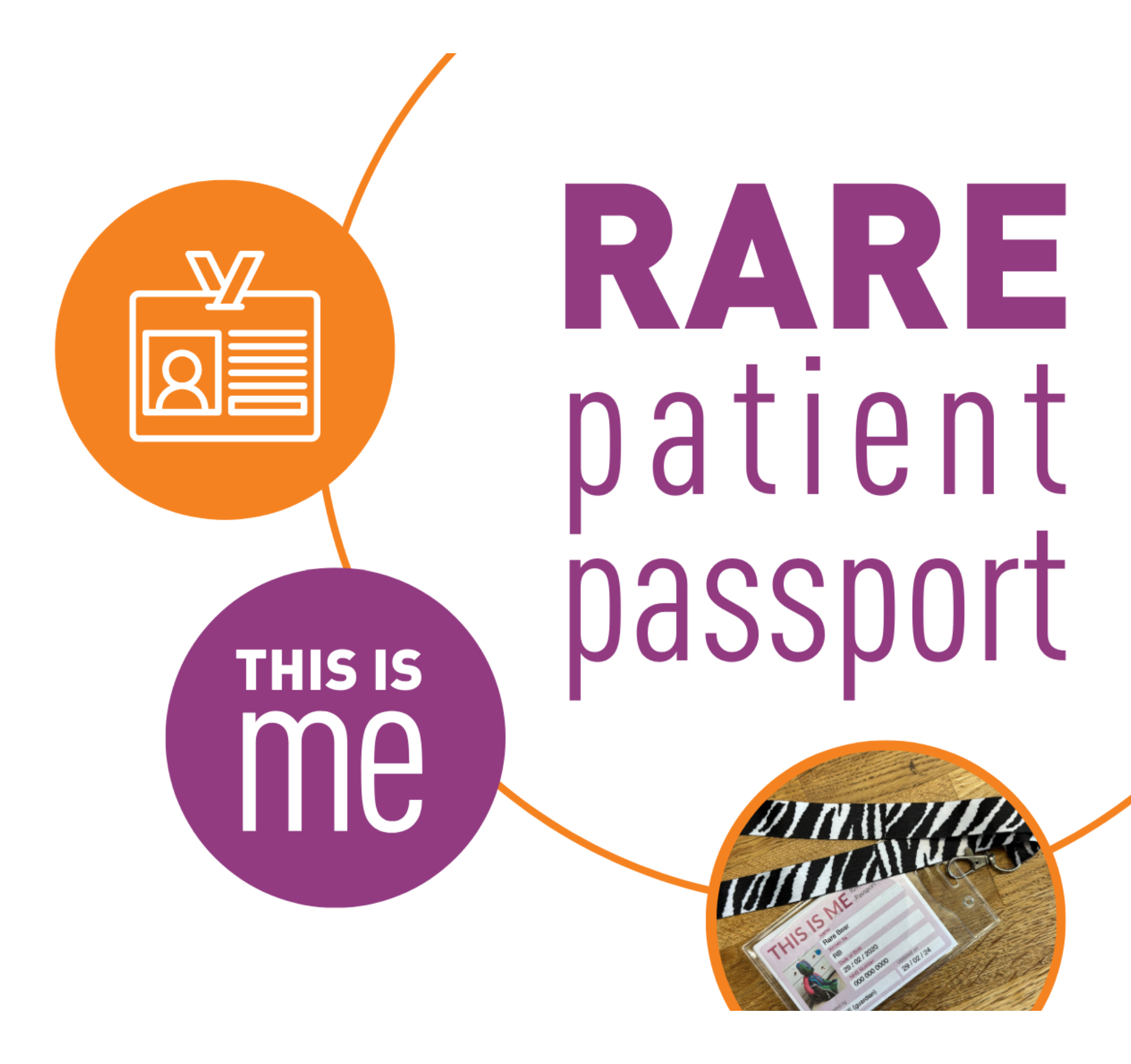
Mast Cell Action are delighted to have partnered with CamRARE to create a Rare Disease Passport for those living with MCAS!
CamRARE have collaborated with families and clinicians to create a fillable, personalised health & care passport to help you communicate your key medical and care information in an emergency, away from home, or when meeting new people.
If you wish to create your own passport, you can navigate to the CamRare form here and you can now choose from the drop-down menu to have a Mast Cell Action passport.
Your Mast Cell Action branded passport will then be sent to you to fill in with all the key information that people need to know about you and your condition.
There is space on the passport for you to fill in your medical specialists, key diagnoses, symptoms, allergies, medications, care needs, and emergency contacts.
You can personalise it in the ‘Additional Information’ section, plus add ‘Top 3 Things to Know’ about you.
It is possible to fold your passport to fit into a wearable lanyard, or file it and store it somewhere safe.
Medical professionals will have all the information they need to care for you in an emergency together in one place.
Why not request your passport today? Click here for the form.

Back to School: Supporting Safe Learning
We are thrilled to introduce our 'Supporting Safe Learning for Students with MCAS' resource pack, designed to help you work with your child's school to create a secure and nurturing educational environment for students with MCAS.
This comprehensive pack is available in three versions: one specifically for students, one for teachers, and a combined version. Each version offers tailored strategies, tools, and resources to support the unique needs of students with MCAS.
The combined pack includes a template letter to be sent to teachers, which you can use to communicate the specific needs and accommodations for your child or the child you care for.
If you do download the pack, we would love to hear your feedback!

School Freedom Kit
After nearly 18 months of work, our Freedom Kit is finally ready to share!
This kit is a resource for families to use to share information with schools in order to help create a plan for children with MCAS in education settings. The kit has information about MCAS and spaces to record information about your child or the child you care for with MCAS to make it easier to share this with education and childcare settings.
We would love to hear your feedback about this resource.
Download the full pack here!

Casper the Chameleon
We are delighted to have published a children's book, Casper the Chameleon. Written by our very own CEO, Joy Mason.
Order your copy for free by completing this form.
We would like to thank Dr Louise Lightfoot for her collaboration on our Casper the chameleon story and Ivy Lewis, our Illustrator. With special thanks to: Tania Freeman for her invaluable expertise as a child creative therapist and for helping to deliver the many supporting resources which have helped bring Casper to life.
The book was created thanks to our Wellbeing Fund. The fund is designed to create sustainable resources to continue to benefit the wellbeing of our community.
Parent support leaflet
Our parent support leaflet has developed to help support parents and carers of children living with systemic mast cell activation and Mast Cell Activation Syndrome (MCAS).
It provides suggestions for how to care for your personal mental wellbeing whilst caring for someone with MCAS, and shares ideas and suggestions for how to communicate and support each other as a family.
In this leaflet, we hope to share ideas and suggestions that support a positive way of thinking and approaching a new way of family life, whilst accepting the challenges that may lay ahead.
Download our newly launched parent support leaflet here

Are you able to help us?
Our mission is to provide invaluable resources and support to individuals and families living with Mast Cell Activation Syndrome (MCAS). We understand the challenges and complexities that come with managing this condition, and we're dedicated to making a meaningful difference in the lives of those affected.
However, we can't do it alone.
As a non-profit organisation, we rely on the generosity and support of individuals like you, to continue our important work. Your contributions enable us to maintain and expand our range of resources, including educational materials, support groups, research initiatives, and more.
By donating, you're directly impacting the MCAS community, offering hope and assistance to those who need it most. Every contribution, no matter the size, makes a difference and is deeply appreciated. If you can, please donate here.
Resources for families
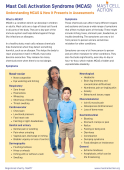
MCAS information for PIP assessors
This resource provides assessors with an overview of MCAS, how it affects daily living, and the support individuals may need, helping ensure assessments are safe, fair and based on an understanding of the condition’s fluctuating nature.

Managing MCAS At Christmas
The festive season can be joyful, but for those living with MCAS, it can also bring extra challenges - new foods, busy gatherings, extra stress and exposure to different things. This guide offers practical ideas to help you plan ahead, look after yourself, and enjoy the parts of Christmas that feel right for you.

Quick Guide to MCAS for Loved-Ones
MCAS is a complex condition and can be hard for our loved-ones to understand. However, their support is crucial for us to be able to manage our condition well. This handy Quick Guide to MCAS is designed to help your loved-one understand MCAS and begin to learn how they can help you. Share this with your loved-ones, so that they can easily understand what MCAS is.

A Quick Guide to MCAS
A handy 2 page Quick Guide to MCAS. An easy to read and understand overview of mast cells, MCAS symptoms, triggers, management, treatment and the histamine bucket theory.
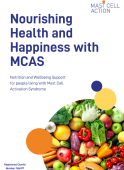
Nourishing Health and Happiness with MCAS
We have worked with registered dietitian, Chloe Hall, to explore some of the most common diets followed by people with MCAS, and the key nutritional concerns that often arise. In this resource, we’ll look at practical ways to support your diet when living with MCAS.

Speaking to Your GP: Language and Tips for Effective Communication
This guide has been created to help you communicate more confidently and effectively with your GP. It offers practical language suggestions that can help you explain your symptoms, request support, and build a more collaborative relationship, whether you have a confirmed diagnosis or are still seeking answers.
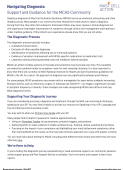
Navigating Diagnosis: Support and Guidance for the MCAS Community
This guide is designed to support individuals in the MCAS community who are navigating the challenges of seeking a diagnosis.
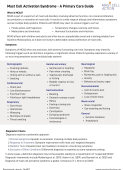
Mast Cell Activation Syndrome - A Primary Care Guide
A primary care guide to Mast Cell Activation Syndrome. It outlines common triggers, diagnostic criteria, and key symptom patterns affecting various body systems, helping clinicians recognise and differentiate MCAS from other conditions.
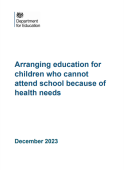
Arranging education for children who cannot attend school because of health needs
This guidance outlines how local authorities and schools can best support children who cannot attend school because of physical or mental health needs.
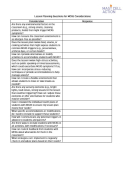
Lesson Planning Questions for MCAS Considerations
This list can help teachers and other educators to include students living with MCAS, when planning lessons and classroom activities
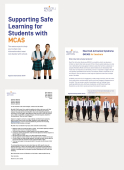
Supporting Safe Learning for Students with MCAS Full Pack
This full resource pack is designed to help you share vital information about mast cell disorder with schools.
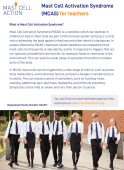
Supporting Safe Learning for Students with MCAS for Teachers
This resource has been designed to explain Mast Cell Activation Syndrome to Teachers and guide them in creating a safe environment for pupils.
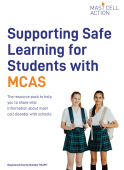
Supporting Safe Learning for Students with MCAS
This kit has been specially designed for parents and primary caregivers of secondary school students who have a mast cell disorder, such as Mast Cell Activation Syndrome (MCAS).
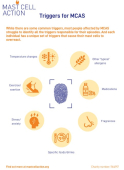
Triggers
This resource details some of the more common triggers of Mast Cell Activation Syndrome.
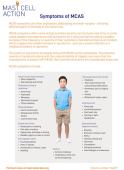
Symptoms of MCAS
This resource details some of the more common symptoms of Mast Cell Activation Syndrome.
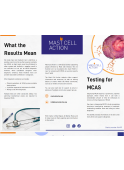
MCAS Testing
This leaflet documents some of the tests that may be used to diagnose MCAS and explains how to read the results.
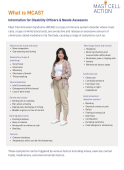
MCAS for Disability Officers
This information guide about MCAS, and the additional needs a student with MCAS may have, can be shared with Disability Officers and other members of staff at universities.

MCAS and higher education
This resource has been designed to provide general guidance and help students to access support as they approach further education at university.
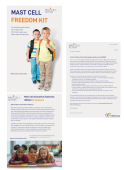
Full school pack
This PDF combines our freedom kit, MCAS for teachers pack and letter for schools in one handy download.
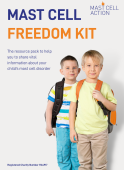
Freedom Kit
The resource pack to help you to share vital information about your child's mast cell disorder with school and other care-givers.

MCAS for teachers
This pack can be used to share information about MCAS with teachers and other care-givers.
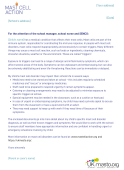
Letter for schools
Use this letter template along with the Freedom kit to share your child's needs with their school or childcare provider
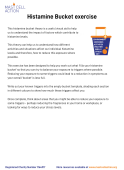
The histamine bucket exercise
This histamine bucket is a useful visual aid in trying to understand the impact of factors contributing to histamine levels.
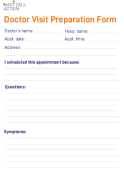
Doctor visit preparation form
A form designed to help you to plan the questions you would like to ask and symptoms you would like to discuss at medical appointments.
Wellbeing resources for families

Quick Guide to MCAS for Loved-Ones
MCAS is a complex condition and can be hard for our loved-ones to understand. However, their support is crucial for us to be able to manage our condition well. This handy Quick Guide to MCAS is designed to help your loved-one understand MCAS and begin to learn how they can help you. Share this with your loved-ones, so that they can easily understand what MCAS is.
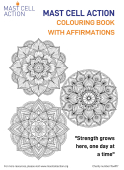
Mandalas Colouring Book with Affirmations
Relaxing and creative activities like mandala colouring can help foster mindfulness and calm a busy mind. Why not spend some time colouring in these beautiful mandalas, drawn by talented Mast Cell Action supporter Ivy Lewis, and lose yourself in your own creative vision. As each colour fills the spaces in this book, may your heart find calm, your mind find focus, and your spirit find strength. You are your own masterpiece.
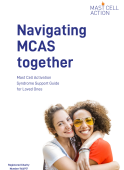
Navigating MCAS together - Mast Cell Activation Syndrome Support Guide for Loved Ones
This guide is for those who are supporting a loved-one with MCAS, and includes advice on maintaining your own physical and emotional health, as well as practical guidance on how you can support your loved-one.
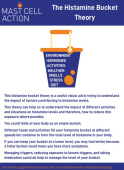
The Histamine Bucket Theory
This histamine bucket theory is a useful visual aid in trying to understand the impact of factors contributing to histamine levels.
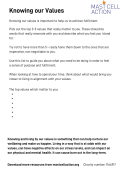
Knowing our values
Knowing our values is important to help us to achieve fulfilment. Use this guide to help you plan what you need to be doing in order to feel a sense of purpose and fulfilment.
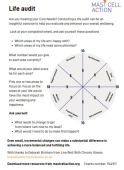
Life Audit
Are you meeting your Core Needs? Conducting a life audit can be an insightful exercise to help you evaluate and enhance your overall wellbeing.

Symptoms of MCAS
This resource details some of the more common symptoms of Mast Cell Activation Syndrome.
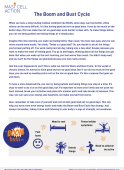
Boom and bust cycle theory for Kids
In the world of chronic illness, it's normal to have good and not-so-good days. But if you do too much on the good days, you can end up needing extra rest on the not-so-good days. It's like a seesaw that goes up and down.
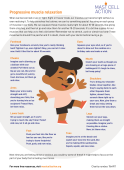
Progressive muscle relaxation
When we feel worried or are in 'fight, flight or freeze' mode, our muscles can become tight without us even realising it. To help ourselves feel calmer, we can try focusing on each group of muscles in our body.

Meditation by Deborah Bircham with music shanti by Annie Brunson
A short mindfulness practice for those feeling illness or discomfort

Mast cells and the mind
A PDF to support our session on mast cells and the mind by Deborah Bircham
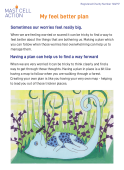
My Feel better plan
When we are feeling worried or scared it can be tricky to find a way to feel better about the things that are bothering us. Download and complete this plan which you can follow when those worries feel overwhelming.
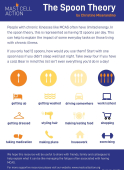
The Spoon Theory
People with chronic illnesses like MCAS often have limited energy. In the spoon theory, by Christine Miserandino, this is represented as having 12 spoons per day. This can help to explain the impact of some everyday tasks on those living with chronic illness.
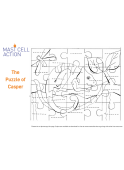
The puzzle of you
In the same way that a jigsaw is made up of lots of different pieces, each of us are madeup of lots of different parts too. This puzzle can help you to talk about MCAS being just one part of that puzzle.
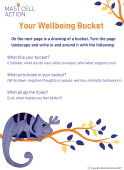
Your wellbeing bucket
An exercise to help children identify the things which make them feel good, those which don't and what helps them to feel better when things aren't going so well.
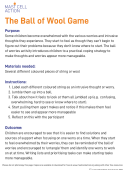
Ball of wool game
The ball of worries activity introduces children to a practical coping strategy to make thoughts and worries appear more manageable.
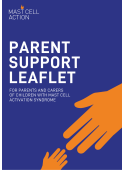
Parent support leaflet
A leaflet designed to help support parents and carers of children living with systemic mast cell activation and MCAS. It provides suggestions for how to care for your personal wellbeing whilst caring for someone with MCAS, and shares ideas and suggestions for how to communicate and support each other as a family.
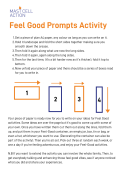
Feel good jar
An exercise to help you find the activities that make you feel good and may help to improve your mood. Suitable for children and adults.
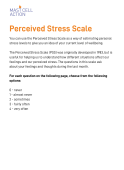
Perceived stress scale - Adults
This worksheet helps you to estimate your personal stress levels and gives you an idea of your current wellbeing.
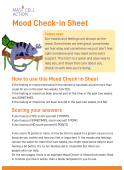
Mood check-in sheet - children
This is a quick and easy resource designed to help you, and those that care about you, to check-in with how you are doing.
Resources for School

Lesson Planning Questions for MCAS Considerations
This list can help teachers and other educators to include students living with MCAS, when planning lessons and classroom activities

Supporting Safe Learning for Students with MCAS Full Pack
This full resource pack is designed to help you share vital information about mast cell disorder with schools.

Supporting Safe Learning for Students with MCAS for Teachers
This resource has been designed to explain Mast Cell Activation Syndrome to Teachers and guide them in creating a safe environment for pupils.

Supporting Safe Learning for Students with MCAS
This kit has been specially designed for parents and primary caregivers of secondary school students who have a mast cell disorder, such as Mast Cell Activation Syndrome (MCAS).

MCAS for Disability Officers
This information guide about MCAS, and the additional needs a student with MCAS may have, can be shared with Disability Officers and other members of staff at universities.

MCAS and higher education
This resource has been designed to provide general guidance and help students to access support as they approach further education at university.

Full school pack
This PDF combines our freedom kit, MCAS for teachers pack and letter for schools in one handy download.

Freedom Kit
The resource pack to help you to share vital information about your child's mast cell disorder with school and other care-givers.

MCAS for teachers
This pack can be used to share information about MCAS with teachers and other care-givers.

Letter for schools
Use this letter template along with the Freedom kit to share your child's needs with their school or childcare provider
Resources for adults

Supporting someone with MCAS at Christmas
A practical festive guide for loved ones, who are supporting those with MCAS at Christmas

MCAS information for PIP assessors
This resource provides assessors with an overview of MCAS, how it affects daily living, and the support individuals may need, helping ensure assessments are safe, fair and based on an understanding of the condition’s fluctuating nature.

Managing MCAS At Christmas
The festive season can be joyful, but for those living with MCAS, it can also bring extra challenges - new foods, busy gatherings, extra stress and exposure to different things. This guide offers practical ideas to help you plan ahead, look after yourself, and enjoy the parts of Christmas that feel right for you.

Quick Guide to MCAS for Loved-Ones
MCAS is a complex condition and can be hard for our loved-ones to understand. However, their support is crucial for us to be able to manage our condition well. This handy Quick Guide to MCAS is designed to help your loved-one understand MCAS and begin to learn how they can help you. Share this with your loved-ones, so that they can easily understand what MCAS is.
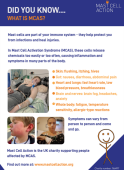
DID YOU KNOW.... What is MCAS?
This poster provides brief facts about MCAS. These are great for sending to friends and family to help them understand or for taking to medical appointments.
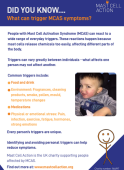
DID YOU KNOW.... What can trigger MCAS symptoms?
This poster provides brief facts around Triggers and MCAS. These are great for sending to friends and family to help them understand or for taking to medical appointments.

DID YOU KNOW.... Fragrances can make people ill
This poster provides brief facts around fragrances and MCAS. These are great for sending to friends and family to help them understand or for taking to medical appointments.
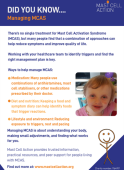
DID YOU KNOW.... Managing MCAS
This poster provides brief facts around managing MCAS. These are great for sending to friends and family to help them understand or for taking to medical appointments.

A Quick Guide to MCAS
A handy 2 page Quick Guide to MCAS. An easy to read and understand overview of mast cells, MCAS symptoms, triggers, management, treatment and the histamine bucket theory.

Nourishing Health and Happiness with MCAS
We have worked with registered dietitian, Chloe Hall, to explore some of the most common diets followed by people with MCAS, and the key nutritional concerns that often arise. In this resource, we’ll look at practical ways to support your diet when living with MCAS.

Speaking to Your GP: Language and Tips for Effective Communication
This guide has been created to help you communicate more confidently and effectively with your GP. It offers practical language suggestions that can help you explain your symptoms, request support, and build a more collaborative relationship, whether you have a confirmed diagnosis or are still seeking answers.

Navigating Diagnosis: Support and Guidance for the MCAS Community
This guide is designed to support individuals in the MCAS community who are navigating the challenges of seeking a diagnosis.
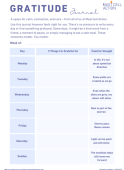
Gratitude Handout
Use this journal however feels right for you. There’s no pressure to write every day or find something profound. Some days, it might be a kind word from a friend, a moment of peace, or simply managing to eat a safe meal. These moments matter. You matter.

Mast Cell Activation Syndrome - A Primary Care Guide
A primary care guide to Mast Cell Activation Syndrome. It outlines common triggers, diagnostic criteria, and key symptom patterns affecting various body systems, helping clinicians recognise and differentiate MCAS from other conditions.
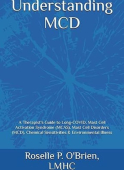
Understanding MCD by Roselle P. O'Brien LMHC
A 'Not-Just-For-Therapists' Guide....." This is written as a guide for therapist’s to help them understand Long Covid, Mast Cell Activation Syndrome (MCAS), Mast Cell Disorders (MCD), Chemical Sensitivities and Environmental Illness. However, it is not just for therapists, and others may also find it very useful.

Triggers
This resource details some of the more common triggers of Mast Cell Activation Syndrome.

Symptoms of MCAS
This resource details some of the more common symptoms of Mast Cell Activation Syndrome.

MCAS Testing
This leaflet documents some of the tests that may be used to diagnose MCAS and explains how to read the results.

Reasonable adjustments in the workplace full pack
This is our full pack with multiple resources to support requesting reasonable adjustments in the workplace with MCAS.
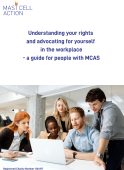
Understanding your rights and advocating for yourself in the workplace - a guide for people with MCAS
This guide helps you to understand your rights and the support that could be put into place in your workplace to help you.

MCAS for employers
This guide for employers explains MCAS and the support that could be put into place in the workplace for those with MCAS.
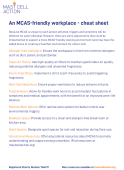
An MCAS-friendly workplace - cheat sheet
This cheat sheet has top tips that might be helpful when creating an MCAS-friendly work place.
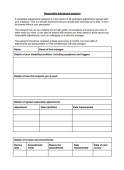
Reasonable adjustment passport
A workplace adjustments passport is a live record of all workplace adjustments agreed with your employer.
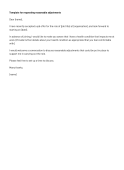
Template for requesting reasonable adjustments
This template may be helpful when requesting reasonable adjustments from your employer.
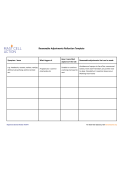
Reasonable Adjustments Reflection Template.
This table may support you to break down the reasonable adjustments that could be made to support you in your workplace.
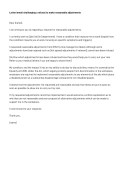
Letter challenging a refusal to make reasonable adjustments
This letter may be useful if you need to challenge a refusal to implement reasonable adjustments in your workplace.
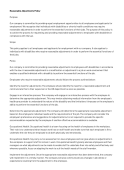
Reasonable Adjustments Policy Template
This template policy can be shared with your workplace to support the development and implementation of a reasonable adjustment policy.

MCAS for Disability Officers
This information guide about MCAS, and the additional needs a student with MCAS may have, can be shared with Disability Officers and other members of staff at universities.

MCAS and higher education
This resource has been designed to provide general guidance and help students to access support as they approach further education at university.

The histamine bucket exercise
This histamine bucket is a useful visual aid in trying to understand the impact of factors contributing to histamine levels.

Doctor visit preparation form
A form designed to help you to plan the questions you would like to ask and symptoms you would like to discuss at medical appointments.
Wellbeing resources for adults

Managing MCAS At Christmas
The festive season can be joyful, but for those living with MCAS, it can also bring extra challenges - new foods, busy gatherings, extra stress and exposure to different things. This guide offers practical ideas to help you plan ahead, look after yourself, and enjoy the parts of Christmas that feel right for you.

Building Resilience with MCAS: Self-Care, Sleep, and Emotional Wellbeing Workbook
This workbook is to go alongside the session on Building Resilience with MCAS: Self-Care, Sleep, and Emotional Wellbeing hosted by Rebecca Fredericks.
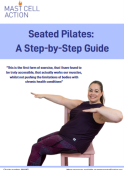
Seated Pilates Guide
This Seated Pilates guide has been designed especially for those living with Mast Cell Activation Syndrome (MCAS). Leanne is a Pain-Free Movement Specialist and Pilates Teacher with lived experience of multiple chronic illnesses. To use this guide, you might like to pick out an exercise, try it, see how you feel and then if you have no adverse effects try another.

Gratitude Handout
Use this journal however feels right for you. There’s no pressure to write every day or find something profound. Some days, it might be a kind word from a friend, a moment of peace, or simply managing to eat a safe meal. These moments matter. You matter.

Mandalas Colouring Book with Affirmations
Relaxing and creative activities like mandala colouring can help foster mindfulness and calm a busy mind. Why not spend some time colouring in these beautiful mandalas, drawn by talented Mast Cell Action supporter Ivy Lewis, and lose yourself in your own creative vision. As each colour fills the spaces in this book, may your heart find calm, your mind find focus, and your spirit find strength. You are your own masterpiece.

Navigating MCAS together - Mast Cell Activation Syndrome Support Guide for Loved Ones
This guide is for those who are supporting a loved-one with MCAS, and includes advice on maintaining your own physical and emotional health, as well as practical guidance on how you can support your loved-one.
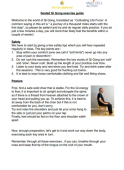
Seated Qigong Guide
This is a seated Qigong guide which focusses on posture, Neck, Shoulders and Spine.
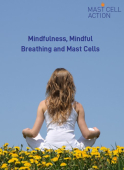
Mindfulness, Mindful Breathing and Mast Cells
This guide explains the benefits of Mindfulness and breathwork and provides short exercises to try.
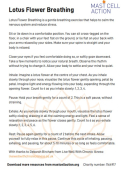
Lotus Flower Breathing
Lotus Flower Breathing is a gentle breathing exercise that helps to calm the nervous system and reduce stress. With thanks to Deborah Bircham from Live Well With Chronic Illness.
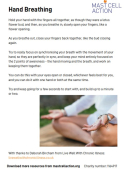
Hand Breathing
This simple breathing exercise has been provided to us by Deborah Bircham from Live Well With Chronic Illness.

Knowing our values
Knowing our values is important to help us to achieve fulfilment. Use this guide to help you plan what you need to be doing in order to feel a sense of purpose and fulfilment.

Life Audit
Are you meeting your Core Needs? Conducting a life audit can be an insightful exercise to help you evaluate and enhance your overall wellbeing.
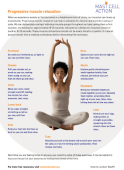
Progressive Muscle Relaxation for Adults
When we experience anxiety or stress, our muscles can tense up. Progressive muscle relaxation can help to alleviate this tension and promote a sense of calm.
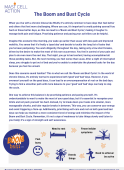
Boom and bust cycle theory for adults
In the world of chronic illness, it's entirely normal to experience both 'good' and 'bad' days. However, if you overexert yourself on the good days, it can lead to an overcompensation of rest on the bad days. Trying to find a smoother path with more balance to your ‘good’ and ‘bad’ days can help to stop the cycle.

Meditation by Deborah Bircham with music shanti by Annie Brunson
A short mindfulness practice for those feeling illness or discomfort

Mast cells and the mind
A PDF to support our session on mast cells and the mind by Deborah Bircham

The Spoon Theory
People with chronic illnesses like MCAS often have limited energy. In the spoon theory, by Christine Miserandino, this is represented as having 12 spoons per day. This can help to explain the impact of some everyday tasks on those living with chronic illness.

Perceived stress scale - Adults
This worksheet helps you to estimate your personal stress levels and gives you an idea of your current wellbeing.
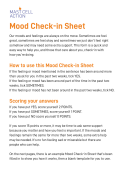
Mood check in sheet - Adult
This is a quick and easy resource designed to help you, and those that care about you, to check-in with how you are doing.
Self-management
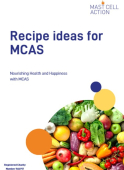
Recipe Ideas for MCAS
From our Nourishing Health & Happiness with MCAS series — simple, nourishing recipes designed to support digestion, comfort, and everyday enjoyment.
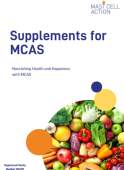
Supplements for MCAS
From our Nourishing Health & Happiness with MCAS series — evidence-informed guidance on supplements that may support wellbeing in MCAS.
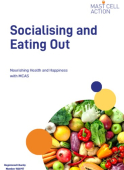
Socialising and Eating Out
From our Nourishing Health & Happiness with MCAS series — practical tips for enjoying meals out and social occasions while supporting your health and comfort.
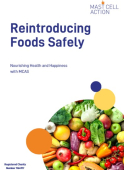
Reintroducing Foods Safely
From our Nourishing Health & Happiness with MCAS series — a gentle guide to reintroducing foods, helping you expand your diet with confidence and care.
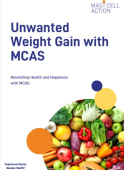
Unwanted Weight Gain with MCAS
From our Nourishing Health & Happiness with MCAS series — explore possible causes of weight changes and find balanced ways to support a healthy body and mind.
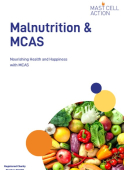
Malnutrition and MCAS
From our Nourishing Health & Happiness with MCAS series — understand the risks of malnutrition with MCAS and learn how to nourish your body safely and effectively.
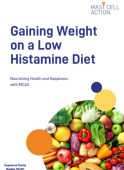
Gaining Weight on a Low Histamine Diet
From our Nourishing Health & Happiness with MCAS series — gentle, practical ideas for maintaining or gaining weight while following a low histamine approach.
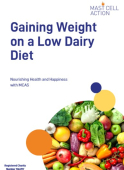
Gaining Weight on a Low Dairy Diet
From our Nourishing Health & Happiness with MCAS series, discover nourishing, dairy-free or low dairy ways to support healthy weight gain while meeting your body’s needs.
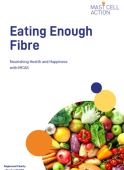
Eating enough fibre with MCAS
From our Nourishing Health & Happiness with MCAS series — discover simple, gentle ways to include more fibre for better gut health and overall wellbeing.

Nourishing Health and Happiness with MCAS
We have worked with registered dietitian, Chloe Hall, to explore some of the most common diets followed by people with MCAS, and the key nutritional concerns that often arise. In this resource, we’ll look at practical ways to support your diet when living with MCAS.
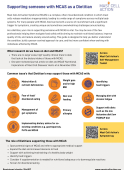
Supporting someone with MCAS as a Dietitian
Supporting Someone with MCAS as a Dietitian is a practical resource designed to help dietitians understand and support people living with Mast Cell Activation Syndrome. It offers guidance on the unique challenges that MCAS presents, particularly around food, nutrition, and symptom management.

Speaking to Your GP: Language and Tips for Effective Communication
This guide has been created to help you communicate more confidently and effectively with your GP. It offers practical language suggestions that can help you explain your symptoms, request support, and build a more collaborative relationship, whether you have a confirmed diagnosis or are still seeking answers.
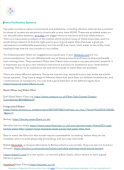
Introduction to Water Purifiers
Handout on different types of water purifiers, created by Deborah Bircham

The Histamine Bucket Theory
This histamine bucket theory is a useful visual aid in trying to understand the impact of factors contributing to histamine levels.
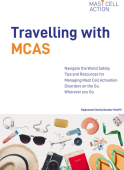
Travelling with MCAS
This downloadable booklet contains tips and resources for managing Mast Cell Activation Disorders on the go, wherever you go.
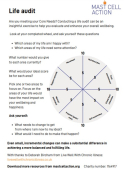
Life Audit
Are you meeting your Core Needs? Conducting a life audit can be an insightful exercise to help you evaluate and enhance your overall wellbeing.

Triggers
This resource details some of the more common triggers of Mast Cell Activation Syndrome.

Symptoms of MCAS
This resource details some of the more common symptoms of Mast Cell Activation Syndrome.
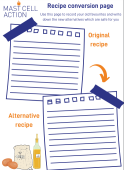
Recipe Conversion
You can use this blank recipe conversion page to note down any MCAS friendly changes you have made to your favourite recipe's.
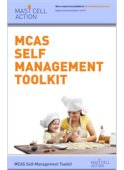
MCAS Self-management toolkit
This toolkit contains information about substances in food and in the environment that can affect mast cell activity or trigger MCAS symptoms. It also includes practical advice to help you understand and avoid these triggers, as needed.
MCAS symptom log

The histamine bucket exercise
This histamine bucket is a useful visual aid in trying to understand the impact of factors contributing to histamine levels.
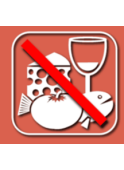
Swiss Interest Group Histamine Intolerance (SIGHI)
SIGHI is an organisation that provides information about histamine-related disorders.
The low histamine chef
Blogs, books and recipes written by the low histamine chef (Yasmina Ykelenstam), a health journalist who has managed her own histamine intolerance for more than 10 years.
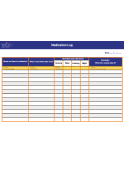
Medication log - adult
A medication timetable to log daily medications
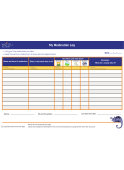
Medication log - children
A medication log blank which you can use to record medications, dosages and medication times in order to keep on track.
Event Slides

Acceptance
PowerPoint slides from Deborah Bircham from Live Well with Chronic Illness' Webinar 'Acceptance'.
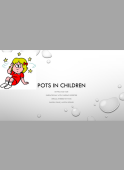
POTS in Children
PowerPoint slides from Dr. Pramod Nair's webinar 'POTS in Children'.

Urology and MCAS
PowerPoint slides from Camilla Gonzalez's webinar 'Urology and MCAS'.
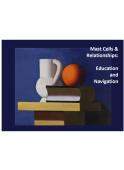
Mast Cells and Relationships: Naviagtion and Education
PowerPoint slides from Roselle O'Brien's webinar 'Mast Cells and Relationships: Navigation and Education'.
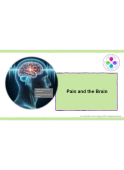
Pain and the Brain
PowerPoint slides from Deborah Bircham from Live Well with Chronic Illness' Webinar 'Pain and the Brain'.
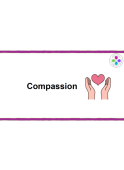
Compassion as a Healing Tool
PowerPoint slides from Deborah Bircham's from Live Well with Chronic Illness webinar 'Compassion as a Healing Tool'. You can find the recording of this session on our YouTube channel.
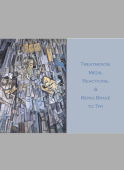
Treatments: Meds, Reactions, & Being Brave to Try
PowerPoint Slides from Roselle O'Brien's webinar 'Treatments: Meds, Reactions, & Being Brave to Try'. You can find the recording of this session on our YouTube channel.

Mast Cells and Relationships: The Garden of Self
PowerPoint slides from Roselle O'Brien's webinar 'Mast Cells and Relationships: The Garden of Self'. You can find the recording of this session on our YouTube channel.

EDS and MCAS from an Osteopathic perspective: How can Osteopathy help you?
PowerPoint slides from Rory Boggett's webinar 'EDS and MCAS from an Osteopathic perspective: How can Osteopathy help you?'.

MCAS and Menopause Workbook
This workbook is designed to go along with our 'Mastering Menopause: Working through Menopause for those with MCAS' webinar hosted by Rebecca Fredericks.

Building Resilience with MCAS: Self Care, Sleep and Emotional Wellbeing
PowerPoint slides from Rebecca Fredericks webinar 'Building Resilience with MCAS: Self Care, Sleep and Emotional Wellbeing'.
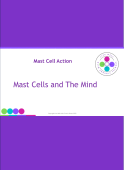
Mast Cells and The Mind
A PDF to support our session on mast cells and the mind by Deborah Bircham

Gratitude
PowerPoint Slides from Deborah Bircham from Live Well with Chronic Illness webinar 'Gratitude' exploring what is Gratitude, and how can it help us.
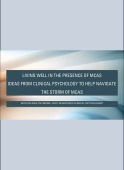
Navigating the Storm
PowerPoint Slides from Dr. Ashlyn Firkins webinar 'Navigating the Storm'. You can find the recording of this session on our YouTube channel.
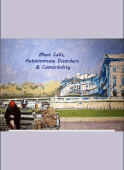
Understanding Mast Cells, Autoimmune Disorders and Comorbidity
PowerPoint slides from Roselle O'Brien's talk 'Understanding Mast Cells, Autoimmune Disorders and Comorbidities'. You can find the recording of this session on our YouTube channel.
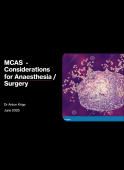
MCAS and Related Conditions - Special Consideration for Anaesthesia Surgery with Dr. Anton Krige
PowerPoint slides from our Dr Anton Krige's webinar 'MCAS and Related Conditions - Special Consideration for Anaesthesia Surgery with Dr. Anton Krige'. You can find the recording of this session on our YouTube channel.

Gratitude Handout
Use this journal however feels right for you. There’s no pressure to write every day or find something profound. Some days, it might be a kind word from a friend, a moment of peace, or simply managing to eat a safe meal. These moments matter. You matter.

Retrain Your Brain, Retrain Your Mast Cells
PowerPoint slides from Roselle O'Brien's webinar 'Retrain Your Brain, Retrain Your Mast Cells'. You can find the recording of this session on our YouTube channel.
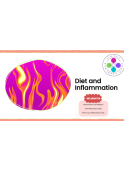
Foods and Inflammation
PowerPoint slides from Deborah Bircham's from Live Well with Chronic Illness webinar 'Foods and Infammation'. You can find the recording of this session on our YouTube channel.
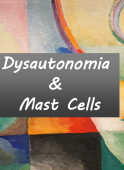
Dysautonomia
PowerPoint slides from Roselle O Brien's webinar 'Dysautonomia'. You can find the recording of this session on our YouTube channel.
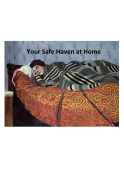
Your Safe Haven at Home
PowerPoint slides from Roselle O Brien's webinar on 'Your Safe Haven at Home'. You can find the recording of this session on our YouTube channel.

MCAS and Environmental Pollution the Toxic Truth
PowerPoint slides from Deborah Bircham's from Live Well with Chronic Illness' webinar 'MCAS and Environmental Pollution the Toxic Truth'. You can find the recording of this session on our YouTube channel.

What is detoxing and how might it help with MCAS?
PowerPoint slides from Deborah Bircham's from Live Well with Chronic Illness' webinar on 'What is detoxing and how might it help with MCAS?'. You can find the recording of this session on our YouTube channel.
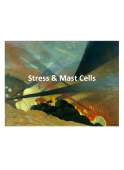
Stress and Mast Cells
PowerPoint slides from Roselle O Brien's webinar on 'Stress and Mast Cells'. You can find the recording of this session on our YouTube channel.

Pillars of Health
PowerPoint slides from Deborah Bircham's from Live Well with Chronic Illness's webinar 'Pillars of Health'.

The Neuroscience of Mindfulness
PowerPoint slides from Deborah Bircham's from Live well with Chronic Illness's webinar 'The Neuroscience of Mindfulness', You can find the recording of this session on our YouTube channel.
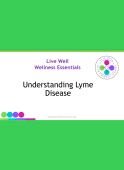
Understanding Lyme Disease – a general introduction to Lyme
PowerPoint slides from Deborah Bircham from Live well with Chronic Illness's webinar 'Understanding Lyme Disease – a general introduction to Lyme'. You can find the recording of this session on our YouTube channel.

How to Fight On in Tough Times – Tools and Tips to Foster Mental Resilience
PowerPoint slides from Deborah Bircham's from Live Well with Chronic Illness' webinar 'How to Fight On in Tough Times – Tools and Tips to Foster Mental Resilience'. You can find the recording of this session on our YouTube channel.

How to be Heard: Advocating for yourself within the NHS
PowerPoint slides from Vicky Pearson's webinar 'How to be Heard: Advocating for yourself within the NHS'. You can find the recording of this session on our YouTube channel.

How to Sleep Well
PowerPoint slides from Deborah Bircham's from Live Well with Chronic Illness webinar 'How to Sleep Well'. You can find the recording of this session on our YouTube channel.

Vagus Nerves and Mast Cells
PowerPoint slides from Roselle O'Brien's webinar 'Vagus Nerves and Mast Cells'. You can find the recording of this session on our YouTube channel.
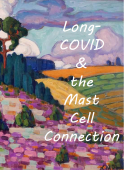
Long COVID and the Mast Cell Connection
PowerPoint slides from Roselle O'Brien's webinar 'Long COVID and the Mast Cell Connection'. You can find the recording of this session on our YouTube channel.

Immune Health - How to Fight off Bugs and Viruses Naturally
Powerpoint slides from Deborah Bircham's from Live Well with Chronic Illness' webinar 'Immune Health - How to Fight off Bugs and Viruses Naturally' . You can find the recording of this session on our YouTube channel.

Mast cells and the mind
A PDF to support our session on mast cells and the mind by Deborah Bircham
"I just wanted to take a moment to say a heartfelt 'thank you' from all our family for your lovely chameleon book and discussion cards. We're in a tough place at the moment where both our sons have crashed with a huge flare-up of their mast cell disorder. And your book was there to help us open the conversation with them about why their bodies are feeling the way they are and to help them find the words and space to tell us how it feels for them."
By donating to Mast Cell Action, you will directly contribute to the development of essential resources that support and uplift the MCAS community. Your generosity will help us to provide critical information, advocacy, and care to those affected by MCAS. Together, we can make a meaningful impact and improve lives. You can donate here.
Become a friend
Sign up to become a Friend of Mast Cell Action so we can keep you up to date on our progress and on how to get involved in our latest campaigns and initiatives.
Donate
Mast Cell Action relies entirely on the generosity of people like you. Please make a donation now and together we can make a difference to those affected by MCAS.







